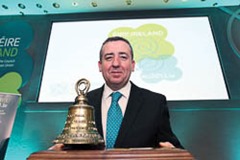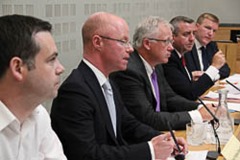A reforming committee
 Peter Cheney reviews the work of the Finance, Public Expenditure and Reform Committee. Members have called for a relaxed freedom of information regime and a Budget that serves the most vulnerable in society as public finances improve.
Peter Cheney reviews the work of the Finance, Public Expenditure and Reform Committee. Members have called for a relaxed freedom of information regime and a Budget that serves the most vulnerable in society as public finances improve.
The issues considered by the Oireachtas’ Joint Committee on Finance, Public Expenditure and Reform are among the most significant facing the State in this term of the Oireachtas. The committee has published 13 substantive reports since the 2011 general election: six on general schemes for legislation and seven on general policy.
Labour TD Alex White (Labour) was the first Chairman of the committee and was succeeded by his party colleague Ciarán Lynch in September 2012 after being appointed to the Government. Lynch was then moved to chair the Banking Inquiry in June and succeeded by Liam Twomey TD (Fine Gael). Senator Aideen Hayden (Labour) is his Vice-Chair.
Legislation
Public hearings on the Credit Union Bill took place on 19-20 September 2012 and gathered a range of views from those working in the sector. The report on the hearings was published in November of that year.
A report on the Houses of the Oireachtas (Inquiries, Privileges and Procedures) Bill was published in March 2013. Presenting Labour’s submission, Ciarán Lynch said that Dáil Éireann lacked the “basic democratic right” to hold inquiries into matters of public importance. It was therefore necessary to convince the public to pass a constitutional amendment which would grant that right. That proposal had been rejected in the October 2011 referendum.
Fianna Fáil commented that the Oireachtas “is not a court system and nor should it be”. The party added that the committee system “serves the people and still holds credibility amongst the public.” Sinn Féin said that the Bill was being discussed too soon after the referendum result. In its report on the Freedom of Information Bill (June 2013), the committee recommended separate legislation for the release of personal data and the release of official information, powers to sanction and fine organisations that breach the Act, and a public interest test with a presumption in favour of openness.
The committee did not set out an opinion on the Regulation of Lobbying Bill 2013 – on which it reported last November. However, it did summarise the main issues raised during the public consultation process (e.g. a code of conduct, exemptions, and sanctions) and asked the Minister to address these in the legislation. The Central Bank Bill, which allows for payments into the European Stability Mechanism, was enacted in June and members were briefly consulted on its general scheme in March. The committee was critical of the short timeframe as the heads of the Bill had been agreed by the Government in December.
No collective view was reached but members suggested that Ireland should benefit from a financial assistance arrangement, similar to that provided in Greece. There were also calls to consult customers of the ICS Building Society before the Bill was presented to the Oireachtas. The Houses of the Oireachtas Commission (Amendment) Bill 2014 allows for the appointment of the Clerk of the Dáil following an open competition. In his response to the committee’s call for submissions, An Ceann Comhairle Seán Barrett proposed a new structure for senior management. The role of Secretary General, he suggested, should be sub-divided into three positions: the clerks of Dáil Éireann and Seanad Éireann, and a CEO responsible for the finances and services of the Houses. Former Clerk Kieran Coughlan supported a “fluid integrated” senior management team operating under a Secretary General/Chief Executive.
Policy
The committee’s first general policy report (February 2012) covered the EU’s Capital Requirements Directive IV legislation on prudential capital banking requirements. The report broadly welcomed the legislation but added that it was “very unfortunate that it took a financial crisis of the current magnitude to bring this clarity of purpose.” The exemption for the credit union movement was welcomed as credit unions have a completely different capital structure from banks.
 The posting of 150,000 letters from the Revenue Commissioners to pensioners in early 2012 caused considerable distress as it indicated that they were liable for more taxation. In its report into the episode (May 2012), the committee found that the issue had lain dormant until the December Budget and then had to be resolved speedily. The committee acknowledged that there was no intention to cause distress and recommended a more formalised approach to transferring data between the Department of Social Protection and the Revenue Commissioners.
The posting of 150,000 letters from the Revenue Commissioners to pensioners in early 2012 caused considerable distress as it indicated that they were liable for more taxation. In its report into the episode (May 2012), the committee found that the issue had lain dormant until the December Budget and then had to be resolved speedily. The committee acknowledged that there was no intention to cause distress and recommended a more formalised approach to transferring data between the Department of Social Protection and the Revenue Commissioners.
Another case involving the Revenue Commissioners was covered in the next report, published in July 2012. The Ombudsman had recommended that they pay €612,616 in redress to a member of the public but the recommendation was rejected. The Revenue Commissioners proposed to pay €300,000 instead and this was accepted by the Ombudsman. The committee unanimously agreed that the full redress should have been made in this case and called on all public bodies to “respect and implement in full the recommendations of the Ombudsman”.
In the same month, members put forward their views on protected disclosures for whistle-blowers. Legislation, in their view, was essential but not sufficient on its own as there has frequently been a reluctance to “speak truth to power” in Irish society. The committee stated that an information campaign and the introduction of workplace codes of practice – making it clear that there was nothing to fear from making disclosures in good faith – would help to change that mind-set.
The committee always receives a large number of pre-Budget submissions. As Budget 2013 approached, it published the submissions received from interest groups.
The publication of responses did not take place for Budget 2014 but the approach was restored for Budget 2015. At that time, the committee also added a comment that Ireland was “more than an economy” and “also a society where the needs of people should always be of paramount importance.” Members therefore called for fresh thinking about how the Budget could protect vulnerable groups in society. They have also reported on the mortgage arrears crisis (July 2014) and demanded “renewed vigour and purpose” in finding a resolution. Recommendations included a formal definition of a sustainable mortgage (from the borrower’s point of view) and a requirement on banks to provide all available solutions to all customers.
Membership
Aside from the Chair and Vice-Chair, the governing parties have 13 members on the committee. Interestingly, these include five ministers: Simon Harris, Heather Humphreys, Dara Murphy (Fine Gael), Kevin Humphreys and Aodhán Ó Ríordáin (Labour). This poses an apparent conflict of interest but a member can only be removed from a committee by a resolution of the House.
The other Fine Gael members are Senator Paul Coghlan, Michael Creed TD, Senator Michael D’Arcy, Regina Doherty TD, Alan Farrell TD, Kieran O’Donnell TD, and Senator Tom Sheahan. Labour is also represented by Arthur Spring TD.
The four Fianna Fáil members are Senator Thomas Byrne, Timmy Dooley, Seán Fleming and Michael McGrath. Sinn Féin is represented by TDs Mary Lou McDonald and Brian Stanley. The other members are Richard Boyd Barrett TD (People Before Profit Alliance), Joe Higgins TD (Socialist), and independents Stephen Donnelly TD and Senator Seán D Barrett.
